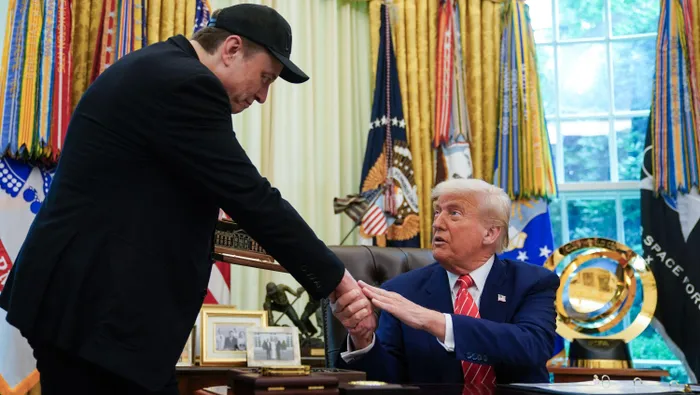Elon Musk's influence on Trump: A closer look at the Afrikaner genocide debate

US president Donald Trump shakes hands with billionaire businessman Elon Musk on May 30 before their public feud.
Image: Allison Robbert / AFP
The public fallout between US President Donald Trump and South African-born billionaire Elon Musk is not bothering one of the political parties in the Government of National Unity (GNU).
Trump and Musk took to their social media platforms this week over differences in his administration’s spending.
Musk stated that Trump would not have won the 2024 presidential elections without his campaign spending hundreds of US dollars.
Freedom Front Plus leader Dr Corné Mulder said he did not believe the approach by Trump or his administration would be changed due to the bitter feud and affect its response to allegations of “genocide” against white Afrikaner farmers in South Africa.
Mulder was responding to questions about whether the fallout could see Trump dramatically changing his views on the white Afrikaner genocide in South Africa.
Musk is widely regarded as a person who wielded immense influence on Trump.
“It is incorrect to assume that US foreign policy is based on the influence of specific individuals. Unhappiness with SA is not something new. Even during the (Joe) Biden administration, a bipartisan bill was introduced in the US Congress to relook the US-SA relationship,” he said.
Political analyst Professor Dirk Kotzé said Musk has in the past been influential in these issues, but there are many other South Africans who are also influential and close to Trump.
“So it will not necessarily change this matter, I don’t think Musk was the one who dealt with or promoted the issue of genocide necessarily, he was more there in terms of black economic empowerment and employment equity and those government policies that he criticised, so he will continue with that until there is an agreement about Starlink,” Kotzé explained.
He added: “When it comes to the Afrikaner issues and what is called genocide, I don’t think he was ever a key person in that, I think that is more where the conservatives – AfriForum, Solidarity, (South African-born American conservative political commentator and radio host) Joe Pollak and others – came in to promote that idea.”
Kotzé said his understanding is that there has been a smaller, second group that went to the US after the earlier AfriForum-Solidarity delegation, but without any public attention because it created much more disturbances within US politics in general.
“So I think it has become a controversial issue in the US, and Trump wants to avoid that. I can see that this is not going to be a public project in the future, it is not something they will announce in the media, welcome them, and have public events,” he predicted.
Kotzé also anticipates that this initiative or project will, over time, actually slow down. “I don’t see it developing strong momentum that it will be something very prominent in the future. I think it is going to disappear over time,” he said.
loyiso.sidimba@inl.co.za